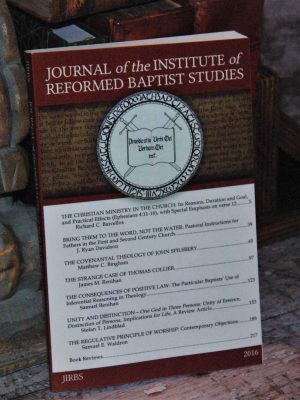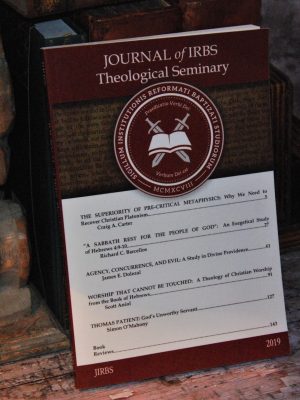£14.00 Original price was: £14.00.£10.00Current price is: £10.00.
Add x10 to Basket = Extra 10% Off Every Title
Orders Over £50/$100 Get Free Shipping
Bulk pricing available. Contact info@brokenwharfe.com.
The 2025 volume of the Journal of the International Reformed Baptist Seminary (JIRBS) continues its commitment to the advancement of confessional Reformed Baptist scholarship. This issue centers on the enduring significance of Nicaea, the sufficiency of Scripture, and the nature of divine impassibility—bringing together original theological research and critical reviews that serve the seminary, the church, and the academy.
Daniel D. Scheiderer opens the issue with “Is Nicaea a Caveat or a Control? A Comparison of Ancient and Modern Approaches to Exegesis.” He argues that the Nicene conclusions must serve not as mere caveats but as interpretive controls for the Christian’s reading of Scripture. By examining key texts—Psalm 2:7, John 17:5, and Romans 1:4—Scheiderer contrasts ancient theological exegesis with modern methods, urging a recovery of premodern interpretive habits governed by Nicene Trinitarianism.
Cameron G. Porter contributes a detailed review essay, “The Nicene Creed: An Introduction by Phillip Cary.” Porter carefully traces Cary’s treatment of each clause of the Creed, from “We believe” to the confession of the Triune God, noting Cary’s emphasis on corporate confession, divine simplicity, and the eternal generation of the Son. The review commends Cary’s work as a concise and effective introduction to Nicene theology, while engaging critically with its interpretive nuances.
In “The Consequence of Perfection: The Nicene Creed and Scripture’s Sufficiency,” Drew Sparks explores the relationship between the formal perfection of Scripture and the authority of the Nicene Creed. Utilizing scholastic categories of causation, Sparks argues that Scripture’s sufficiency anticipates and grounds derivative rules of faith such as the Creed, which functions as a “ruled rule”—a secondary and derivative authority that receives its light from the perfection of the biblical text.
Josh Tinkham’s “Do We Worship an Emotional God?” addresses the doctrine of divine impassibility, defending the classical confession that God is “without passions.” Engaging with contemporary challenges to this doctrine, Tinkham demonstrates that divine impassibility safeguards the perfection of God’s nature while preserving the reality of His covenantal dealings with His people.
The volume concludes with two book reviews. James P. Butler reviews Ancient Christian Texts: The Gospel of John, Cyril of Alexandria, highlighting Cyril’s consistent articulation of the unity of the divine nature and the trinity of persons in the one being of God. Daniel D. Scheiderer reviews Matthew Barrett’s Simply Trinity: The Unmanipulated Father, Son, and Spirit, assessing Barrett’s engagement with the modern “Trinity Debate” and his call for a return to Nicene orthodoxy rooted in historic catholic theology.
With its combination of exegetical, historical, and doctrinal studies, JIRBS 2025 continues to serve as a vital academic and ecclesial resource. Each article exemplifies the seminary’s confessional and pastoral aim—to advance sound doctrine for the glory of the Triune God and the edification of Christ’s church.
| ISBN | 978-1917873055 |
|---|---|
| Authors | Daniel D. Scheiderer; Cameron G. Porter; Drew Sparks; Josh Tinkham; James P. Butler; Daniel D. Scheiderer |
| Pages | 148 |
| Dimensions | 6 x 0.35 x 9 inches |





